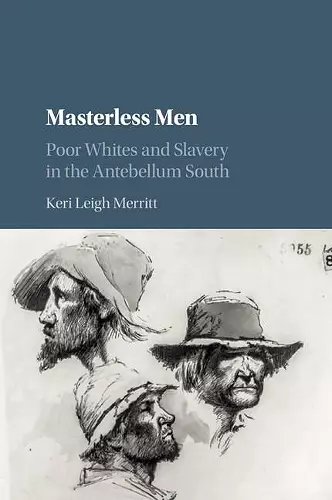Masterless Men
Poor Whites and Slavery in the Antebellum South
Format:Paperback
Publisher:Cambridge University Press
Published:14th Dec '17
Currently unavailable, and unfortunately no date known when it will be back
This paperback is available in another edition too:
- Hardback£57.99(9781107184244)

This book examines the lives of the Antebellum South's underprivileged whites in nineteenth-century America.
Owning neither land nor slaves, poor whites comprised about a third of the American South's white population in 1860. Focusing on land, labor, and legal history, Masterless Men shows what happens to excess workers in a slave society.Analyzing land policy, labor, and legal history, Keri Leigh Merritt reveals what happens to excess workers when a capitalist system is predicated on slave labor. With the rising global demand for cotton - and thus, slaves - in the 1840s and 1850s, the need for white laborers in the American South was drastically reduced, creating a large underclass who were unemployed or underemployed. These poor whites could not compete - for jobs or living wages - with profitable slave labor. Though impoverished whites were never subjected to the daily violence and degrading humiliations of racial slavery, they did suffer tangible socio-economic consequences as a result of living in a slave society. Merritt examines how these 'masterless' men and women threatened the existing Southern hierarchy and ultimately helped push Southern slaveholders toward secession and civil war.
'In Masterless Men, Keri Leigh Merritt offers a sweeping analysis of how we should understand the place of poor whites in the larger narrative of the Old South. Her detailed examination of the Deep South's impoverished white class will deepen our understanding about the human and economic costs of America's system of black slavery.' Charles Bolton, University of North Carolina, Greensboro
'Merritt moves class front and center as she documents the brutal, unfair realities of life for poor whites struggling to survive in a society structured against them. Her work holds tremendous implications for our understanding of social relations, the economy, politics, and the law in the Old South.' Jeff Forret, author of Race Relations at the Margins: Slaves and Poor Whites in the Antebellum Southern Countryside
'Keri Leigh Merritt reveals the parallel roots of white poverty and slavery in the antebellum South. With precision and conviction, she demonstrates that landlessness, low wages, and illiteracy, accompanied by legal and extra-legal harassment by the state, were not mere by-products of slavery, but the result of policies that enriched slaveholders while muting dissent by poor whites.' Victoria Bynum, Texas State University, San Marcos
'Eloquently argued, Merritt's work will be of interest to economic, social, and legal historians as its attention to poor whites' place in southern society provides a more complete understanding of the history of the 19th-century South. Essential.' T. K. Byron, Choice
'… the lesson to be drawn from Merritt's magnificent work is that the problem of justice requires enormous bridge-building exercises if we wish to level the playing field without worsening other forms of inequality. History shows us the limits of ideological progress, but also reveals opportunities that can be seized, if only we can muster the courage and the know-how.' Robert L. Tsai, Los Angeles Review of Books
ISBN: 9781316635438
Dimensions: 230mm x 153mm x 20mm
Weight: 560g
371 pages